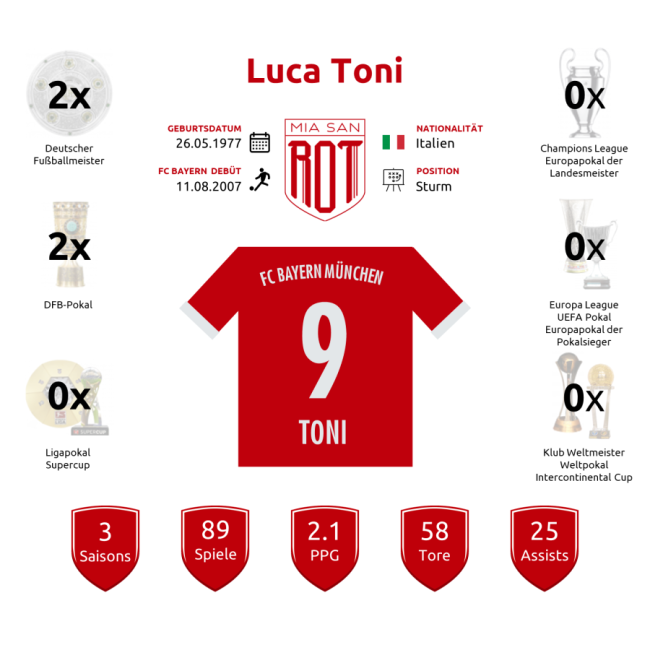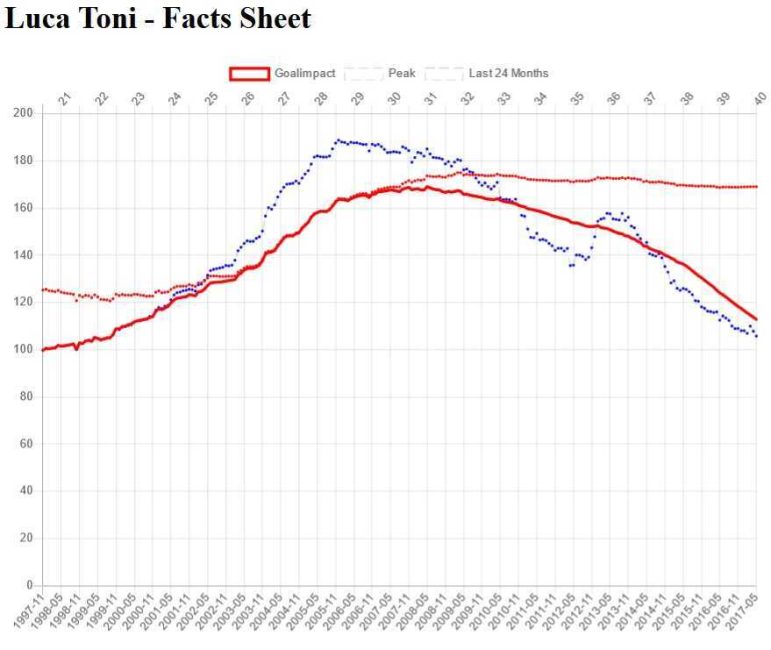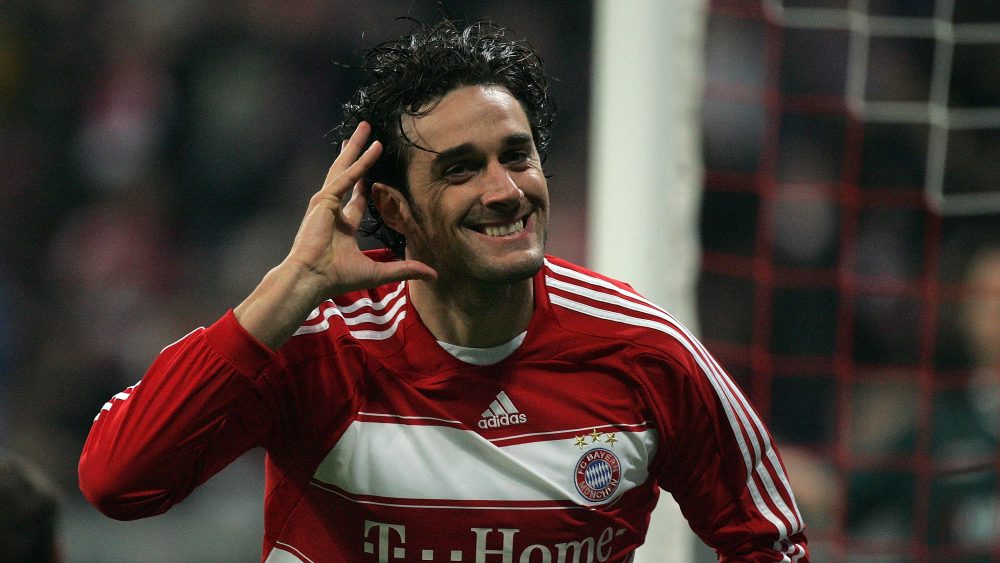FC Bayern – Miasanrot Advent Calendar, Door 9: Luca Toni
A STRANGE TRANSFER
In the summer of 2007, FC Bayern were angry. Really, incredibly angry. Having missed out on Champions League qualification, they decided to dip into their famous fixed deposit account with a vengeance. A statement transfers it should be. The 24-year-old Franck Ribéry made complete sense, of course, but Luca Toni appeared like an odd choice.
It made complete sense that FC Bayern were looking for a new striker, as they were understandably dissatisfied with Roy Makaay’s 16 goals the season before. A new striker was needed. In fact, they had already wanted to replace Makaay with his Dutch nemesis Ruud van Nistelrooy the year before, but Real Madrid was already the bigger name in world football 16 years ago.
What about the Toni decision makes you wonder, however: Even back then, FC Bayern had a policy of not offering contracts longer than a year to players over 30, and replacing a 32-year-old Makaay with Toni, who was only two years younger, did not seem very forward-thinking.
Even more against him, however, were the finances, which, however, only came to light years later through Toni’s court case over the popular German church tax. Toni completely tore apart Bayern’s salary structure. In addition to the €11 million transfer fee, there was also a fairly decent €7 million signing fee and a €6 million annual net salary. These were figures that FC Bayern would only pay its most deserving world-class players years later. A Ribéry needed years to get to this level, but Toni got this salary straight away.
He did not join from a world club, his career before the Bayern move was an up and down affair. In 2006, he became world champion. But, frankly speaking, his contribution to Italy’s fairy tale was comparatively small, despite his regular appearances. He scored only two goals in the whole tournament, a brace for 2-0 and 3-0 against Ukraine in the quarter-finals.

SIGNORE 1-0
With such a high price tag, FC Bayern naturally wanted to see performances, and Toni delivered right from the start. He scored just as many goals in his first ten competitive games, seven of which were the all important 1-0. Ribéry may have worked his magic and controlled Zé Roberto, but it was Luca Toni who scored the goals that brought Bayern back to the Bundesliga throne.
He also shone in the cup competitions: he scored both goals in the DFB-Pokal final against Dortmund. In his eleven UEFA Cup matches, he scored an impressive ten times.
He couldn’t quite match his tally from the beginning of the season in the league – which only underlines Robert Lewandowski and Gerd Müller’s consistency, as well as the overall quality of today’s Bayern. But the 24 Bundesliga goals were still more than his predecessor ever managed to do in a season. Among them, against Hannover, was the first Bundesliga hat-trick by a Bayern player since 1989.
A NATURAL SNIPER
Goals, goals, goals. All we talk about here is goals, but isn’t there more to a football game than the mere haul of goals? Doesn’t a striker have to have more skills than just scoring?
Well. No. Not in Luca Toni’s case. Toni was simply a goal-scorer extrordinaire, the knack for playmaking that his striker partner Klose possessed was completely foreign to him. Instead, he made the best of his 1.93 metre frame. When he was given close cover, no defender could simply push the bull away. In addition, FC Bayern finally once more radiated aerial threat with him. Roy Makaay was no pipsqueak either, but Toni’s heading was of a different class.
Yes, occasionally Toni surprised with excellent shows of technical ability, but sideways bicycle kicks like against Hannover, dinks like against Bochum or screamer with the outside of the foot like against Dortmund were the absolute exception. Most of the time, Toni simply lurked in the penalty area and sniffed out goals like a beagle sniffs out contraband. His physical presence made him no phantom, but he still contributed little more to the game than his Dutch predecessor.
But what separates him from Makaay is his lack of an identity shaping famous goal, which every Bayern fan can still recall years later. With Makaay, everyone remembers his 10-second goal against Real, but Toni was not granted such a signature success. The two goals he scored in the “Miracle of Getafe” would probably be the most likely candidates, but the subsequent miserable defeat in St. Petersburg quickly deflated the story. If Bayern had lived up to their role as favourites in the UEFA Cup, however, it would certainly have been associated with Luca Toni. Regrettably, however, it remained a subjunctive.
BURNING BRIGHTLY, FADING QUICKLY
The Italian brought a lot of joy to Bayern, was immediately popular with his exuberant, joyous manner. It didn’t bother anyone that hardly any players from other countries before or since refused to learn the German language so aggressively. Toni was simply Toni. He scored goals, turned heads and put people in a good mood.

After his excellent first year – 39 goals in 46 competitive games speak for themselves – the storm around Toni quieted down. After a still acceptable nine goals in the first half of the season, he only scored five more in the second half. During this time, he repeatedly struggled with his Achilles tendon.
After a disastrous season overall, the club reacted and signed Mario Gómez and Ivica Olić in the summer. When Arjen Robben was added as well and the new coach Louis van Gaal switched to a system with only one striker, the world champion was only fourth choice. In the winter, he fled back home and FC Bayern were certainly happy to get him off the payroll.
His time at FC Bayern was over, and the same seemed to be true of his career itself. He moved around from club to club in Serie A, even spent half a year in the UAE. Nowhere could the aging world champion find a place to make himself at home. Until, yes, an amazing thing happened to him at the age of 36. At his fifth Italian club in four years, he suddenly blossomed in the golden late autumn of his career. In his first year with promoted Hellas Verona, he scored 20 goals, in his second year as many as 22, and at the age of 38 he was once again the top scorer in Serie A. Having shown everyone once again, the following year he was finally able to say “Ciao” to his proud career.









